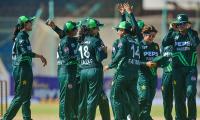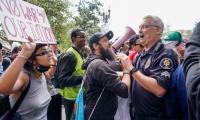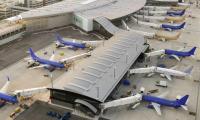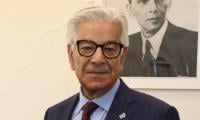ISLAMABAD: The US special envoy for Afghanistan Zalmay Khalilzad is arriving here Monday and is expected to meet the country’s top government officials and the military leadership.
Sources in the government and the Foreign Office expect the US envoy to update the Pakistani leadership on the two-day peace talks held in Doha and discuss the future course of action as Pakistan remains one of the key players working with international stakeholders to bring back peace to war-torn Afghanistan.
The meeting in the Qatari capital has been described as historic because the Afghan government and the Taliban were meeting for the first time to discuss the prospects of ending the decades-long war and find out ways to agree on the future shape of the Afghan government. Words of mutual praise and hope were splattered all over the international media but there were cautious warnings as well that too many expectations from the first round of talks might be premature.
International media outlets reported that no formal meetings between the two sides were reported in Doha on Sunday, but Qatar’s state news agency reported teams led by Taliban’s political chief Mullah Abdul Ghani Baradar and the head of the peace process for the Afghan government, Abdullah Abdullah, had met the Qatari Emir, Sheikh Tamim bin Hamad al-Thani.
The first round of talks was described by officials from both sides as cordial but the Washington Post wrote that the talks remained focussed on logistics and not the substance of what it would take to bring peace to Afghanistan. The same went for a follow-up meeting on Sunday, the paper said.
Both sides have agreed to form smaller teams that are expected to meet more frequently and remain in communication with each other.
After the first day of talks, Zalmay Khalilzad told the media: “I’ve heard positive things about the meeting between the two sides.” The envoy spoke about a number of views the two sides already share like the importance of sovereignty, independence and the desire to live in an Islamic country.
Media reports suggest that the Afghan government team and the Taliban have expressed a desire to meet without the presence of officials from the United States or any other country. Khalilzad said that he supported that decision but that the United States would remain “ready to help and prepared to help if help is needed.”
The agenda for Doha talks largely remained a guesswork but observers agreed that democracy, women and minority rights, civil liberties and the makeup of the country’s security forces were expected to be possible sticking points.
Both sides have dramatically different ideas for the future of Afghanistan. The Taliban do not support elections and aim to see their country governed by a strict interpretation of Islamic law. The government and civil society groups would like to preserve the progress the country has made about democracy, human rights and civil liberties.
According to media reports, Abdul Ghani Baradar, the Taliban’s top political figure, has agreed to having equal rights during his opening remarks Saturday, saying the group seeks an Afghanistan “where everyone lives in peace and harmony and no one feels discrimination.”
Leaders of the Afghan government - President Ashraf Ghani and Abdullah Abdullah, the chairman of Afghanistan’s High Council for National Reconciliation - have spoken about a future where the Afghans living under government control would probably have to make sacrifices as peace talks progress. But Abdullah told the Washington Post: “For me, one person, one vote — I don’t call anything a red line — but that’s critical . . . and compromises on these things will not get us to peace.”
Abdullah Abdullah, suggested the Taliban could offer a ceasefire in exchange for the release of more of their jailed fighters.
"This could be one of their ideas or one of their demands," said Abdullah who left Doha for Kabul on Sunday night as scheduled.
He said the talks should continue in the "spirit of moving towards peace".
"There should first be a significant reduction in violence, then humanitarian ceasefires, and then a nationwide and permanent ceasefire," he said.
The Afghan government side said on social media that "the first meeting between the contact groups of the two negotiation teams took place (Sunday)".
Schedules for the talks and a code of conduct were discussed, the tweet said without giving details of next steps.
In a statement, Afghan President Ashraf Ghani called for "a lasting and dignified peace" that preserved "the achievements of the past 19 years".
Government negotiator Habiba Sarabi said the start of talks had been "very positive".
Abdullah said the process "could be the start of history made in the coming future -- and hopefully sooner rather than later".
As the two sides remained busy talking about the prospects of peace in Afghanistan, there were reports that Taliban and Afghan government forces clashed across Afghanistan.
Khawar Manika's counsel continued his arguments on Wednesday in a petition filed by Imran Khan and Bushra Bibi
IHC reserved judgment on the petition against registration of cases against former interior minister Sheikh Rashid on...
Saudi woman who was reportedly kidnapped from Islamabad’s residential Sector F-8 in mysterious circumstances, has...
Pakistan Navy warship rescued 8 Iranian fishermen after their boat caught fire in the open sea
SC dismissed appeal against SHC order that turned down application of partner seeking extension of time to furnish...
Executive board of International Monetary Fund will meet on April 29 to discuss the approval of $1.1 billion funding...







